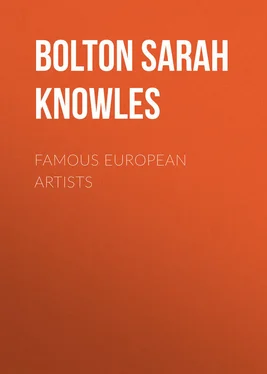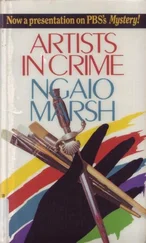Sarah Bolton - Famous European Artists
Здесь есть возможность читать онлайн «Sarah Bolton - Famous European Artists» — ознакомительный отрывок электронной книги совершенно бесплатно, а после прочтения отрывка купить полную версию. В некоторых случаях можно слушать аудио, скачать через торрент в формате fb2 и присутствует краткое содержание. ISBN: , Жанр: foreign_prose, foreign_antique, foreign_language, на английском языке. Описание произведения, (предисловие) а так же отзывы посетителей доступны на портале библиотеки ЛибКат.
- Название:Famous European Artists
- Автор:
- Жанр:
- Год:неизвестен
- ISBN:http://www.gutenberg.org/ebooks/39380
- Рейтинг книги:5 / 5. Голосов: 1
-
Избранное:Добавить в избранное
- Отзывы:
-
Ваша оценка:
- 100
- 1
- 2
- 3
- 4
- 5
Famous European Artists: краткое содержание, описание и аннотация
Предлагаем к чтению аннотацию, описание, краткое содержание или предисловие (зависит от того, что написал сам автор книги «Famous European Artists»). Если вы не нашли необходимую информацию о книге — напишите в комментариях, мы постараемся отыскать её.
Famous European Artists — читать онлайн ознакомительный отрывок
Ниже представлен текст книги, разбитый по страницам. Система сохранения места последней прочитанной страницы, позволяет с удобством читать онлайн бесплатно книгу «Famous European Artists», без необходимости каждый раз заново искать на чём Вы остановились. Поставьте закладку, и сможете в любой момент перейти на страницу, на которой закончили чтение.
Интервал:
Закладка:
When she visited Ferrara, Duke Hercules II., who had married Renée of France, the daughter of Louis XII., received her, says Trollope, "with every possible distinction on the score of her poetical celebrity, and deemed his city honored by her presence. He invited, we are told, the most distinguished poets and men of letters of Venice and Lombardy to meet her at Ferrara. And so much was her visit prized that when Cardinal Giberto sent thither his secretary, Francesco della Torre, to persuade her to visit his episcopal city, Verona, that ambassador wrote to his friend Bembo, at Venice, that he had like to have been banished by the Duke, and stoned by the people, for coming there with the intention of robbing Ferrara of its most precious treasure, for the purpose of enriching Verona."… The learned and elegant Bembo writes of her that he considered her poetical judgment as sound and authoritative as that of the greatest masters of the art of song… Bernardo Tasso made her the subject of several of his poems. Giovio dedicated to her his life of Pescara, and Cardinal Pompeo Colonna his book on "The Praises of Women;" and Contarini paid her the far more remarkable compliment of dedicating to her his work "On Free Will."
"Paul III. was," as Muratori says, "by no means well disposed towards the Colonna family. Yet Vittoria must have had influence with the haughty and severe old Farnese. For both Bembo and Fregoso, the Bishop of Naples, have taken occasion to acknowledge that they owed their promotion to the purple in great measure to her."
It is probable that she first met Michael Angelo in the year 1536. He was then sixty-one, and she forty-six. "A woman," says Grimm, "needs not extreme youth to captivate the mind of a man who discovers in her the highest intelligence… She belonged to that class of women who, apparently with no will of their own, never seek to extort anything by force, and yet obtain everything which is placed before them… How tenderly she exercised her authority over Michael Angelo, who had never before been approached; whom she now for the first time inspired with the happiness of yielding to a woman, and for whom the years which she passed at that time in Rome she made a period of happiness, which he had never before known… Whenever we contemplate the life of great men, the most beautiful part of their existence is that, when meeting with a power equal to their own, they find one worthy of measuring the depths of their mind… There is no deeper desire than that of meeting such a mind; no greater happiness than having found it; no greater sorrow than to resign this happiness, whether it be that it has never been enjoyed, or that it has been lost."
Francesco d'Ollanda, a portrait-painter, has described one of the Sundays which he spent in the company of Michael Angelo and Vittoria, "the latter of whom he calls beautiful, pure in conduct, and acquainted with the Latin tongue; in short, she is adorned with every grace which can redound to a woman's praise."
When Michael Angelo arrived at her home on that Sunday, Vittoria, "who could never speak without elevating those with whom she conversed and even the place where she was, began to lead the conversation with the greatest art upon all possible things, without, however, touching even remotely upon painting. She wished to give Michael Angelo assurance." She said to him, "I cannot but admire the manner in which you withdraw yourself from the world, from useless conversation, and from all the offers of princes who desire paintings from your hand, – how you avoid it all, and how you have disposed the labor of your whole life as one single, great work."
"Gracious lady," replied Michael Angelo, "these are undeserved praises; but, as the conversation has taken this turn, I must here complain of the public. A thousand silly reproaches are brought against artists of importance. They say that they are strange people, that they are not to be approached, that there is no bearing with them. No one, on the contrary, can be so natural and human as great artists… How should an artist, absorbed in his work, take from it time and thought to drive away other people's ennui?.. An artist who, instead of satisfying the highest demands of his art, tries to suit himself to the great public, who has nothing strange or peculiar in his personal exterior, or rather what the world calls so, – will never become an extraordinary mind. It is true, as regards the ordinary race of artists, we need take no lantern to look for them; they stand at the corner of every street throughout the world, ready for all who seek them… True art is made noble and religious by the mind producing it. For, for those who feel it, nothing makes the soul so religious and pure as the endeavor to create something perfect, for God is perfection, and whoever strives after it is striving after something divine. True painting is only an image of the perfection of God, a shadow of the pencil with which he paints, – a melody, a striving after harmony."
And then, says d'Ollanda, "Vittoria began a eulogium upon painting; she spoke of its ennobling influence upon a people, – how it led them to piety, to glory, to greatness, until the tears came into her eyes from the emotion within."
For ten or twelve years, in the midst of long separations and many sorrows, this affection of Vittoria and Michael Angelo shed its transcendent light over two great lives. It was impossible not to love a woman with such tenderness, sympathy, and sincerity. We may admire a beautiful or a brilliant woman, but if she lacks tenderness and sincerity the world soon loses its allegiance. When political changes made it necessary for her to leave Rome and go to the Convent of St. Catherine at Viterbo, Michael Angelo wrote her daily, while he painted in the Pauline Chapel, after the "Last Judgment" was finished, the "Crucifixion of Peter," and the "Conversion of Paul." In 1542 she wrote him tenderly, "I have not answered your letter before, thinking that if you and I continue to write according to my obligation and your courtesy, it will be necessary that I leave St. Catherine's Chapel, without finding myself with the sisters at the appointed hours, and that you must abandon the Pauline Chapel, and not keep yourself all the day long in sweet colloquy with your paintings … so that I from the brides of Christ, and you from his vicar, shall fall away."
However she may chide him for writing too frequently, his words and works are most precious to her. When he paints for her a picture, she writes, "I had the greatest faith in God, that he would give you a supernatural grace to paint this Christ; then I saw it, so wonderful that it surpassed in every way my expectations. Being emboldened by your miracles, I desired that which I now see marvellously fulfilled, that is, that it should stand in every part in the highest perfection, and that one could not desire more nor reach forward to desire so much. And I tell you that it gave me joy that the angel on the right hand is so beautiful; for the Archangel Michael will place you, Michael Angelo, on the right hand of the Lord at the judgment day. And meanwhile I know not how to serve you otherwise than to pray to this sweet Christ, whom you have so well and perfectly painted, and to entreat you to command me as altogether yours in all and through all."
What delicate appreciation of the genius of the man she loved! How it must have stimulated and blessed him! But more than all else she loved Michael Angelo for the one thing women value most in men, the strength and constancy of a nature that gives a single and lasting devotion.
She gave to Michael Angelo a vellum book, containing one hundred and three of her sonnets, and sent him forty new ones which she composed at the convent of Viterbo. These he had bound up in the same book which he received from her; her for whom, he said, "I would have done more than for any one else whom I could name in the world." He wrote back his thanks with the sweet self-abnegation of love.
Читать дальшеИнтервал:
Закладка:
Похожие книги на «Famous European Artists»
Представляем Вашему вниманию похожие книги на «Famous European Artists» списком для выбора. Мы отобрали схожую по названию и смыслу литературу в надежде предоставить читателям больше вариантов отыскать новые, интересные, ещё непрочитанные произведения.
Обсуждение, отзывы о книге «Famous European Artists» и просто собственные мнения читателей. Оставьте ваши комментарии, напишите, что Вы думаете о произведении, его смысле или главных героях. Укажите что конкретно понравилось, а что нет, и почему Вы так считаете.












